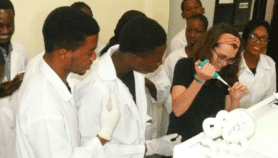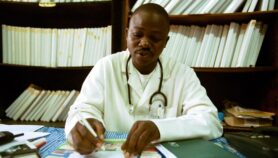By: Katie Mantell
Send to a friend
The details you provide on this page will not be used to send unsolicited email, and will not be sold to a 3rd party. See privacy policy.
An initiative to boost the innovation capacity of poor nations and help them export their products to the developed world is to be launched by the Commonwealth Science Council (CSC).
The Sustainable Trade and Innovation Centre, which aims to facilitate exports of ‘sustainable’ goods and services from developing countries, will be launched at the World Summit on Sustainable Development (WSSD), which opens in Johannesburg, South Africa in August.
“There is a major gap between the products that are coming from some [poorer] countries and the requirements and standards that are recognised in the West,” says T J Ruredzo, chief programme officer at the CSC. “We need to marry the two.”
The centre will provide information, advice and know-how to enable people to get their products on the market. Ultimately it aims to strengthen capacities for management and innovation among developing-country producers, and improve trade performance among poor nations.
The initiative was given the go-ahead at the CSC’s Executive Committee Meeting and Ministerial Gathering in Limpopo Province, South Africa, earlier this month.
However, the location and the funding required for the centre will not be finalised until the Johannesburg Summit, says Ruredzo.
The initiative, led by CSC chair Ben Ngubane, the South African minister for science and technology, is being developed in collaboration with the International Institute for Environmental Development (IIED) and the European Partners for the Environment (EPE).
It is being guided by an advisory board that includes representatives from Benin, Brazil, Canada, Germany, India, Jamaica, Mauritius, The Netherlands, Uganda, the United Nations Conference on Trade and Development (UNCTAD) and the United Nations Environment Programme (UNEP).
“Science and technology-based innovation is the key to future prosperity,” Ngubane said in a statement presented at the Steering Committee of Senior Officials of CSC held in London this week (24-25 June).
“In our gathering in Lompopo Province, we recognised that the challenge for the CSC is to help the Commonwealth address the problems of the low-income, technologically-excluded regions through a systematic transfer of knowledge and technology tailored to the individual needs and skills-base of particular countries.”
There is a shift in focus within the CSC towards innovation, he said. A key agreement to emerge from this month’s meeting was that the Commonwealth Knowledge Network — an initiative set up in 1999 to ensure the sharing of technical knowledge between countries — should become an ‘innovation network’.
“Our special focus will be on indigenous/local knowledge with the primary aim being to improve the quality of life of the poor people of the Commonwealth,” Ngubane said in his speech in London.
The network will showcase examples of successful solutions used by people in one society that have then been adopted in other countries.
“The idea is that many Commonwealth countries have problems, and many countries have solutions, and it’s a question of bringing together the two,” says Ruredzo. “It’s a case of networking the brains of the Commonwealth and the institutions to get solutions for development.”
© SciDev.Net 2002













